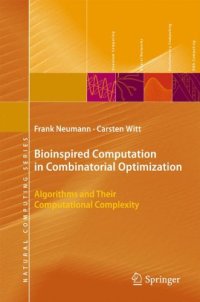
Ebook: Bioinspired Computation in Combinatorial Optimization: Algorithms and Their Computational Complexity
- Genre: Mathematics // Computational Mathematics
- Tags: Algorithm Analysis and Problem Complexity, Optimization, Theory of Computation, Artificial Intelligence (incl. Robotics)
- Series: Natural Computing Series
- Year: 2010
- Publisher: Springer-Verlag Berlin Heidelberg
- Edition: 1
- Language: English
- pdf
Bioinspired computation methods, such as evolutionary algorithms and ant colony optimization, are being applied successfully to complex engineering and combinatorial optimization problems, and it is very important that we understand the computational complexity of these search heuristics. This is the first book to explain the most important results achieved in this area.
The authors show how runtime behavior can be analyzed in a rigorous way. in particular for combinatorial optimization. They present well-known problems such as minimum spanning trees, shortest paths, maximum matching, and covering and scheduling problems. Classical single-objective optimization is examined first. They then investigate the computational complexity of bioinspired computation applied to multiobjective variants of the considered combinatorial optimization problems, and in particular they show how multiobjective optimization can help to speed up bioinspired computation for single-objective optimization problems.
This book will be valuable for graduate and advanced undergraduate courses on bioinspired computation, as it offers clear assessments of the benefits and drawbacks of various methods. It offers a self-contained presentation, theoretical foundations of the techniques, a unified framework for analysis, and explanations of common proof techniques, so it can also be used as a reference for researchers in the areas of natural computing, optimization and computational complexity.
Bioinspired computation methods such as evolutionary algorithms and ant colony optimization are being applied successfully to complex engineering problems and to problems from combinatorial optimization, and with this comes the requirement to more fully understand the computational complexity of these search heuristics. This is the first textbook covering the most important results achieved in this area. The authors study the computational complexity of bioinspired computation and show how runtime behavior can be analyzed in a rigorous way using some of the best-known combinatorial optimization problems -- minimum spanning trees, shortest paths, maximum matching, covering and scheduling problems. A feature of the book is the separate treatment of single- and multiobjective problems, the latter a domain where the development of the underlying theory seems to be lagging practical successes.This book will be very valuable for teaching courses on bioinspired computation and combinatorial optimization. Researchers will also benefit as the presentation of the theory covers the most important developments in the field over the last 10 years. Finally, with a focus on well-studied combinatorial optimization problems rather than toy problems, the book will also be very valuable for practitioners in this field.